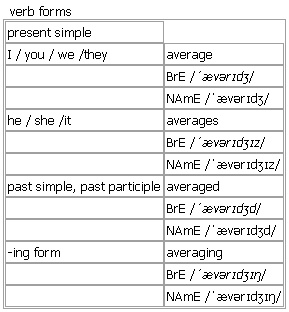|
Từ điển Oxford Advanced Learner 8th
 average
average

aver·age [average averages averaged averaging] adjective, noun, verb BrE [ˈævərɪdʒ] NAmE [ˈævərɪdʒ]
adjective
1. only before noun calculated by adding several amounts together, finding a total, and dividing the total by the number of amounts
•an average rate/cost/price
• Average earnings are around £20 000 per annum.
•at an average speed of 100 miles per hour
2. typical or normal
•40 hours is a fairly average working week for most people.
•children of above/below average intelligence
•£20 for dinner is about average.
3. ordinary; not special
• I was just an average sort of student.
Word Origin:
late 15th cent.: from French avarie ‘damage to ship or cargo’, earlier ‘customs duty’, from Italian avaria, from Arabic ‘awār ‘damage to goods’; the suffix -age is on the pattern of damage. Originally this referred to a tax on exported goods. The meaning later changed so that it referred to money due from goods that had been lost or damaged at sea. It referred specifically to the way the losses were divided between the owners of the vessel and the owners of the cargo (late 16th cent.). This gave rise to the general sense of calculating the mean (mid 18th cent.).
Thesaurus:
average adj.
1.
•The route is for walkers of average ability.
normal • • ordinary • • typical • • common •
the average/normal/ordinary/common man
a/an average/normal/ordinary person
a/an average/normal/ordinary/typical working day
2. (often disapproving)
•The quality has been pretty average.
unremarkable • |disapproving ordinary •
an average/unremarkable/ordinary person
average/ordinary players
an average/ordinary sort of person/thing
Example Bank:
•an above average climb in prices
•An entrance fee of £5 is about average.
•He was quite an average sort of student, nothing out of the ordinary.
•It's a lot less tiring than the average day in the office.
•On an average day they sell more than £2 000 worth of vegetables.
•The quality has been pretty average.
•The route is for walkers of average ability.
Derived Word: ↑averagely
Derived: ↑average out ▪ ↑average something out
noun countable, uncountable
1. the result of adding several amounts together, finding a total, and dividing the total by the number of amounts
• The average of 4, 5 and 9 is 6.
• Parents spend an average of $220 a year on toys.
•If I get an A on this essay, that will bring my average (= average mark/grade) up to a B+.
see also ↑grade point average
2. a level which is usual
•Temperatures are above/below average for the time of year.
•400 people a year die of this disease on average.
• Class sizes in the school are below the national average.
see the law of averages at ↑law
Word Origin:
late 15th cent.: from French avarie ‘damage to ship or cargo’, earlier ‘customs duty’, from Italian avaria, from Arabic ‘awār ‘damage to goods’; the suffix -age is on the pattern of damage. Originally this referred to a tax on exported goods. The meaning later changed so that it referred to money due from goods that had been lost or damaged at sea. It referred specifically to the way the losses were divided between the owners of the vessel and the owners of the cargo (late 16th cent.). This gave rise to the general sense of calculating the mean (mid 18th cent.).
Example Bank:
•His test results are well above average.
•On average, prices have risen 6%.
•The national average is just over two children per family.
•You'll have to calculate the average.
•the student with the best grade point average in his class
verb
1. transitive ~ sth no passive to be equal to a particular amount as an average
• Economic growth is expected to average 2% next year.
•Drivers in London can expect to average about 12 miles per hour (= to have that as their average speed).
2. transitive, intransitive ~ (sth) to calculate the average of sth
•Earnings are averaged over the whole period.
Verb forms: 
Word Origin:
late 15th cent.: from French avarie ‘damage to ship or cargo’, earlier ‘customs duty’, from Italian avaria, from Arabic ‘awār ‘damage to goods’; the suffix -age is on the pattern of damage. Originally this referred to a tax on exported goods. The meaning later changed so that it referred to money due from goods that had been lost or damaged at sea. It referred specifically to the way the losses were divided between the owners of the vessel and the owners of the cargo (late 16th cent.). This gave rise to the general sense of calculating the mean (mid 18th cent.).
|
|
|
▼ Từ liên quan / Related words
Related search result for "average"
|
|
